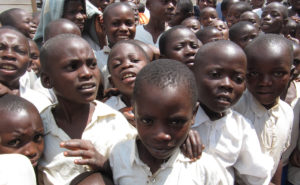Ten years ago this month, the United Nations published the Congo Mapping Exercise Report. The landmark report documented more than 600 incidents of war crimes and crimes against humanity committed in the Democratic Republic of the Congo (DRC) between March 1993 and June 2003, with women and children as the primary victims. In addition to identifying perpetrators responsible for these atrocities, the Mapping Report issued recommendations for judicial reforms and alternative mechanisms to secure justice for the Congolese people. To this day, none of these recommendations have been implemented. The failure to create and operationalize justice mechanisms has allowed for persistent violence against civilians to continue in the Congo. Unless the injustices of the past are addressed, the recurring cycles of mass atrocity crimes will continue.
Support survivors – please support the Accountability for Sexual and Gender-based Violence as a Tool of Conflict Act
For years activists, including JWW partner and Nobel Peace Prize laureate Dr. Denis Mukwege, have demanded an end to impunity through the implementation of the Mapping Report. Dr. Mukwege’s calls for justice have led to threats on his life, including just recently when he decried yet another massacre in the Congo. A JWW petition, signed by many of our committed supporters, helped bring U.N. peacekeepers back to watch over Dr. Mukwege’s Panzi Hospital complex in Bukavu. Although Dr. Mukwege is receiving protection, justice – the goal for which he is willing to assume great personal risk – has yet to be realized.
The Congo suffers from a complex web of humanitarian emergencies. It has the largest number of internally displaced people in Africa, with civilians constantly being forced to leave their homes to escape insecurity and armed violence. In addition to these constant outbreaks of violence, especially in its eastern provinces, the DRC is home to the second-highest number of severely food insecure people in the world – a crisis that has been exacerbated by COVID-19. The Congo is also battling a protracted Ebola epidemic in which aid workers have been accused of sexual abuse.
The Need for Internal Investigation
Stopping these waves of atrocities is exceedingly difficult because the perpetrators’ true identity is often unknown. Many have attributed the majority of atrocities in the North Kivu region to an Islamist rebel group called the Allied Democratic Forces (ADF). Congolese activists and organizations, including Jewish World Watch, have called this analysis into question. There is now growing support for the narrative that other bad actors are involved in these atrocities, including regional powers. For justice to have a chance, the true nature of these violations, including the perpetrators behind them, must first be understood. There must be an independent, impartial investigation to hold those responsible to account. The international community must help the Congolese people identify the perpetrators and create the legal mechanisms – whether based in the Congo or abroad –that will enable the country to break the cycle of impunity –> please change to: enable the country to address its past and ongoing atrocities and finally break the cycle of impunity.
JWW’s Work in the Congo
The DRC is the focus of many of JWW’s projects. These initiatives address the structural, underlying drivers of mass atrocities, restore dignity, build leadership, and foster hope for a conflict-free future.
- We work to counter impunity for survivors of sexual violence, bringing both medical assistance and legal aid to last-mile communities subjected to mass rape campaigns with Dr. Mukwege and Panzi Hospital. Click here to learn more.
- We support the extraction of children from armed groups–where they are forced to work as child soldiers, sex slaves, and porters – and help give these children a new lease on life. Click here to learn more.
- We nurture the education of Congo’s future generation, helping war-affected children become the leaders of tomorrow through a curriculum built on principles of peace and conflict resolution. Click here to learn more.
- We provide COVID-19 awareness information, emergency food supplies, and personal protective equipment (PPE) to Congo’s most vulnerable populations. Click here to learn more.
Please support our work in the Congo and around the world.
What you can do
The United States currently has no legislation focused on the Democratic Republic of the Congo. However, the House and Senate both have legislation in the pipeline that would elevate the use of sexual violence as a weapon of war – a common practice in the DRC. The Accountability for Sexual and Gender-based Violence as a Tool of Conflict Act (H.R. 3212 & S. 1777) would amend the US human rights sanctions regime to add sexual violence to the list of violations that would trigger Global Magnitsky sanctions against human rights violators. Support this important push for accountability today.
Support survivors – please support the Accountability for Sexual and Gender-based Violence as a Tool of Conflict Act


